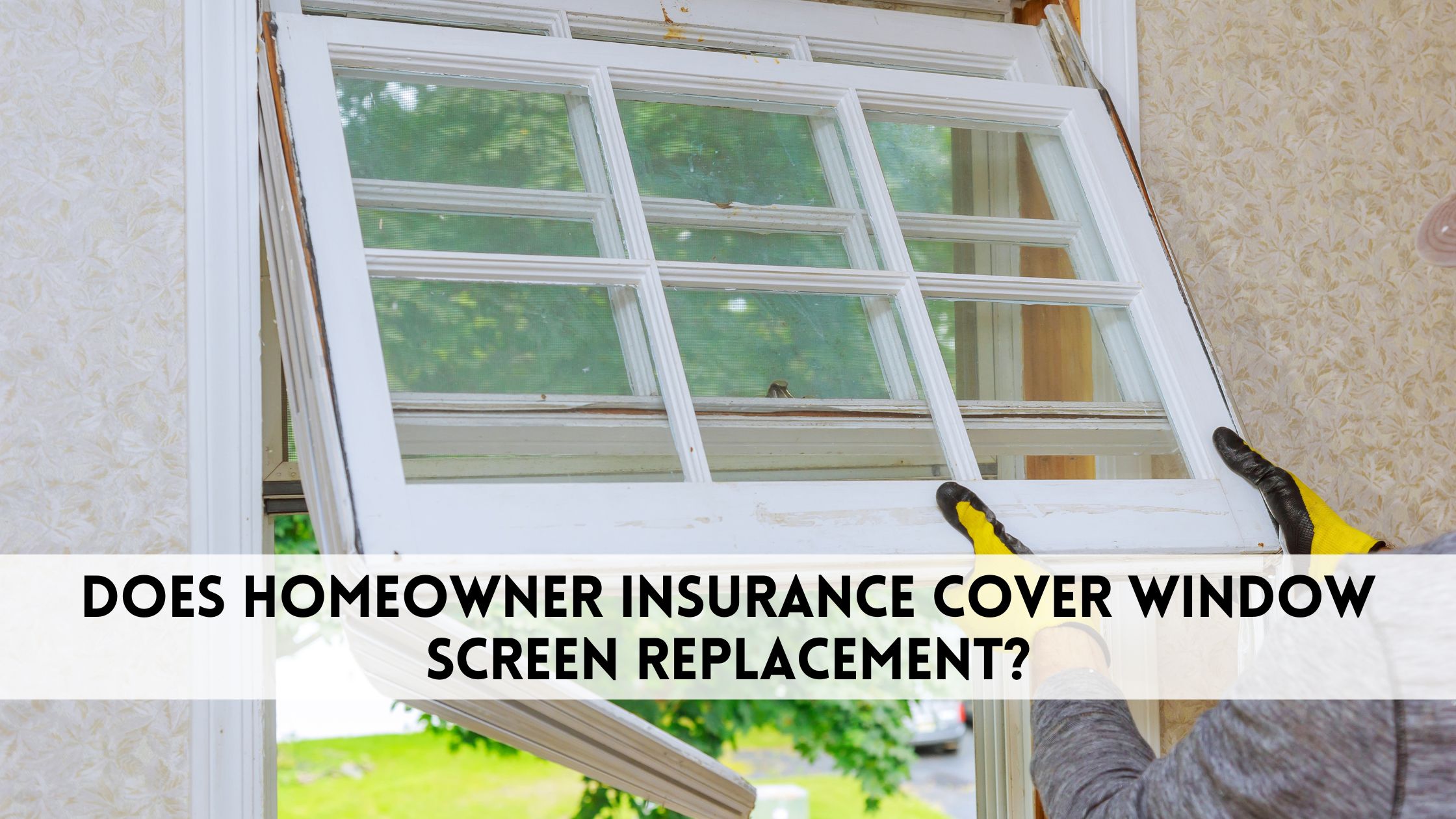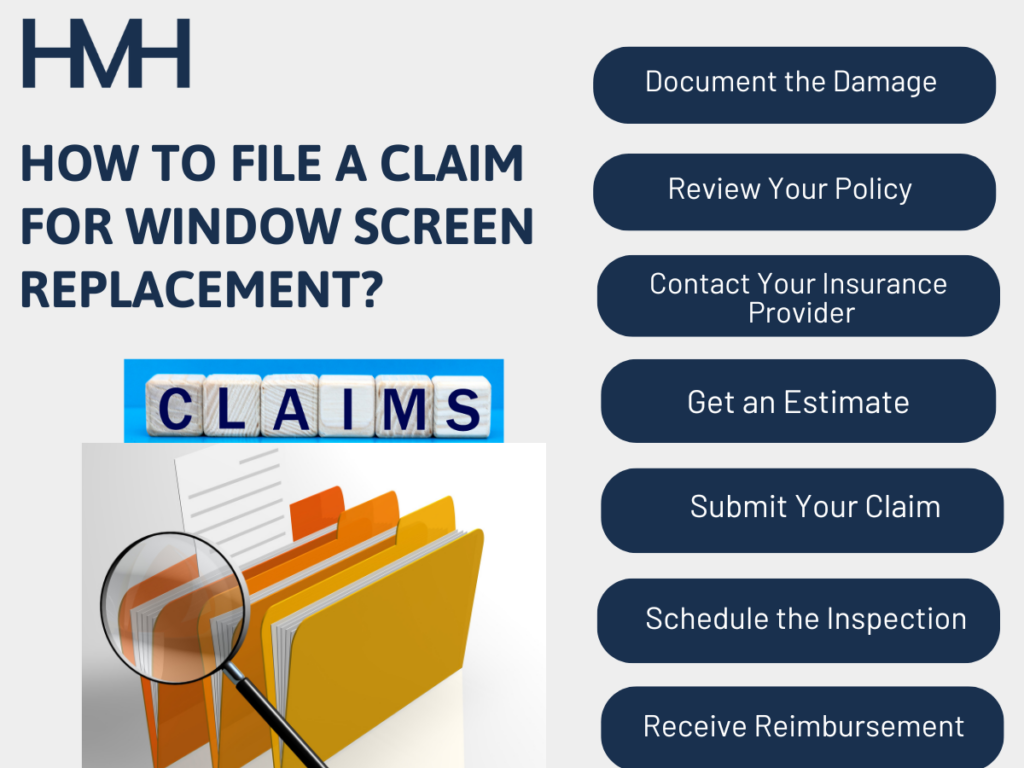Does Homeowner Insurance Cover Window Screen Replacement?

Window screens are essential in maintaining a comfortable and functional living environment. They protect your home from external elements such as insects, dust, and debris while allowing fresh air to circulate indoors. However, like any other component of your home, window screens are not immune to damage. Whether it’s due to a sudden storm, vandalism, or an unfortunate accident, the need for repairs or replacements can arise unexpectedly.
This raises an important question for many homeowners: Does homeowner insurance cover window screen replacement? Understanding the variation of your insurance policy is crucial, as coverage for window screens depends on the cause of the damage and the specific terms outlined in your plan. In this blog, we will provide clear insights into whether homeowner insurance typically covers window screen replacement, how to file a claim, and additional tips to navigate the process effectively. Read on to ensure you’re informed and prepared for any unexpected damages.
Does Homeowner Insurance Cover Window Screen Replacement?
The answer depends on the cause of the damage. Homeowner insurance typically covers damages resulting from unforeseen events such as storms, hail, or vandalism. However, it generally does not cover wear and tear, neglect, or pet-related damage. Here’s a small breakdown:
| Type of Damage | Covered by Homeowner Insurance? | Details |
| Storm Damage (e.g., hail, wind) | Yes | Damage caused by storms is usually covered under most policies. |
| Accidental Damage | No | Accidents like children or pets tearing the screen are typically not covered. |
| Vandalism | Yes | If someone deliberately damages your window screen, it’s likely covered. |
| General Wear and Tear | No | Normal aging and deterioration of the screen are considered maintenance issues. |
| Fallen Objects (e.g., branches) | Yes | Coverage applies if the damage results from covered perils like falling tree branches. |
| Accidents caused by insured events | Yes | Covered if the damage is a result of a covered peril (e.g., a fire). |
Storm Damage (e.g., hail, wind):
If your window screens are damaged due to a storm, hail, or strong winds, homeowner insurance typically covers the cost of repair or replacement. Storm-related damages fall under the category of unforeseen events, making them eligible for coverage under most policies. Insurance providers recognize these natural disasters as beyond the homeowner’s control, ensuring financial support when such incidents occur. Be sure to document the damage with photos and provide evidence of the storm when filing your claim.
Accidental Damage:
Accidents, such as children or pets tearing the window screens, are not covered by homeowner insurance. These damages are considered part of routine maintenance or personal responsibility, rather than the result of an insured peril. For these situations, homeowners are expected to handle the repair costs themselves, as this type of damage is not insurable.
Vandalism:
Intentional destruction, such as vandalism, is generally covered by homeowner insurance. If someone deliberately damages your window screens, your policy is likely to reimburse you for the repair or replacement. Does homeowner insurance cover window screen replacement? Acts of vandalism are considered criminal activities, and insurance providers offer protection against such unexpected events. When filing a claim, ensure you report the incident to local authorities and provide your insurer with a police report.
General Wear and Tear:
Normal aging or deterioration of window screens is not covered by homeowner insurance. Wear and tear are expected over time and are classified as part of regular home maintenance. Homeowners are responsible for replacing or repairing screens that have aged or deteriorated due to prolonged exposure to weather or neglect.
Fallen Objects (e.g., branches):
If your window screens are damaged by fallen objects like tree branches during an insured event, the cost of replacement is typically covered. For example, if a storm causes branches to fall and tear the screens, your insurance policy may reimburse you for the damage. It’s important to confirm that the event causing the fallen object is listed as a covered peril in your policy.
Accidents Caused by Insured Events:
Damage resulting from insured events, such as a fire or other covered peril, is included in most homeowner insurance policies. In these cases, the screen damage is considered part of the overall loss caused by the insured event. For instance, if a fire damages your windows and screens, your policy will cover the repair or replacement costs as part of the claim.

How Do You File a Claim for Window Screen Replacement?
Filing a claim for window screen replacement may seem challenging at first, but following a clear and systematic process can make it much easier.
Document the Damage
The first and most important step is gathering evidence. When the damage occurs:
- Take clear photos: Capture multiple angles of the damaged window screen to provide a complete view of the issue. This helps establish the extent of the damage.
- Note the date and cause: Write down the exact date and a brief explanation of how the damage occurred. Whether it’s due to a storm, vandalism, or another event, accurate records are crucial.
Why it matters: Proper documentation serves as proof for your claim and helps your insurance provider understand the situation better.
Review Your Policy
Before proceeding, take a moment to review your homeowner insurance policy.
- Look for covered perils: Check whether the damage falls under covered events such as storms, hail, or vandalism.
- Understand exclusions: Policies typically don’t cover wear and tear, pet damage, or neglect. Knowing this upfront avoids unnecessary claims.
Why it matters: This ensures your claim is valid and saves time by identifying whether the damage is covered.
Contact Your Insurance Provider
Once you confirm the damage is covered:
- Report the incident promptly: Most insurers require claims to be filed within a specific time frame after the damage occurs.
- Provide all necessary details: Share photos, documentation, and an explanation of how the damage happened. This ensures the insurer has all the information they need to process your claim.
Why it matters: Timely and thorough communication prevents delays and ensures your claim is processed efficiently.
Get an Estimate
Before submitting your claim, obtain a professional estimate:
- Hire a licensed contractor: Contact a reputable repair service or contractor to assess the damage and provide a detailed cost estimate for replacement or repair.
- Share the estimate with your insurer: Most insurance providers will ask for this document as part of the claims process.
Why it matters: A professional estimate establishes the financial scope of the damage and helps your insurer determine reimbursement.
Submit Your Claim
With all the necessary information in hand:
- Complete all forms: Fill out your insurer’s claim form accurately, providing all requested details.
- Attach supporting documents: Include photos, repair estimates, and any other required evidence to back your claim.
- Double-check for errors: Mistakes or missing information can cause unnecessary delays.
Why it matters: A well-prepared claim speeds up the approval process and reduces the chance of rejection.
Schedule the Inspection
In many cases, your insurance provider will assign an adjuster to verify the damage.
- Be available for the inspection: Ensure that someone is present when the adjuster arrives to answer any questions.
- Provide additional details if requested: If the adjuster needs more evidence, be prepared to supply it promptly.
Why it matters: A smooth inspection process ensures your claim is processed without delays.
Receive Reimbursement
Once your claim is approved:
- Understand the payout: The reimbursement will typically be based on your policy terms, minus any deductibles.
- Use the funds appropriately: Ensure the reimbursement is used for repairing or replacing the damaged screen as intended.
Why it matters: Following through ensures your home is restored to its original condition and keeps your insurance record clean.
What Does Homeowner Insurance Typically Cover?
Homeowner insurance is designed to protect you financially against specific perils that may cause damage to your home and its components, including window screens.
Structural Damage
This is one of the primary coverages in a homeowner’s insurance policy. It protects the physical structure of your home, including walls, roofs, and attached fixtures such as windows and doors.
- How It Relates to Window Screens: If your window screens are damaged due to insured events like storms, hail, or vandalism, they may be covered under structural damage. For example, a tree branch breaking during a storm and tearing the screen could qualify for coverage. However, routine wear and tear or neglect will not be covered.
Personal Property
This coverage protects your belongings, such as furniture, appliances, and clothing, from risks like theft, fire, or natural disasters.
- How It Relates to Window Screens: While personal property coverage does not typically apply directly to window screens, it might come into play if an insured event damages both your personal belongings and the window screen. For instance, if a burglar breaks your window and damages the screen while stealing property, the theft and screen damage could both be covered.
Liability Coverage
Liability insurance protection provides financial security if someone is injured on your property or if you accidentally cause damage to someone else’s property.
- How It Relates to Window Screens: While liability coverage doesn’t cover physical damage to your own property (like window screens), it could indirectly apply if the damage causes an injury. For example, if a damaged window screen leads to a guest cutting, liability coverage might handle the associated medical costs.
Living Expenses
This coverage reimburses you for temporary housing and related costs if your home becomes uninhabitable due to a covered event.
- How It Relates to Window Screens: If a significant storm causes widespread damage to your home, including broken windows and screens, and renders the house unsafe to live in, ALE might cover your temporary accommodation costs while the damage, including window screen replacement, is repaired.
Additional Information
To maximize your insurance benefits:
- Keep Your Policy Updated:
Regularly review your policy to ensure it aligns with your home’s value and potential risks.
- Maintain Your Home:
Regular maintenance prevents unnecessary damage and ensures that your claims are valid.
- Understand Deductibles:
Most policies include deductibles, which are amounts you must pay before insurance covers the remaining costs. For minor damages like window screens, the deductible may exceed repair costs.
Final Words
Homeowner insurance may cover window screen replacement, but coverage largely depends on the specific cause of the damage and the terms of your policy. So, Does homeowner insurance cover window screen replacement? Damage caused by covered risks such as storms, vandalism, or other insured events is generally included, while wear and tear, neglect, or pet-related damage is typically excluded. To make the most of your coverage, it’s essential to thoroughly review your policy, document the damage with clear evidence, and follow the correct claims process.
By staying informed about what your homeowner insurance covers and understanding how to file a claim, you can save both time and money while assuring your home is well-protected. Always consult your insurance provider for detailed information regarding your policy, and don’t hesitate to ask questions if you’re unsure about your coverage. Taking these proactive steps can help you handle unexpected damages efficiently and stress-free.



